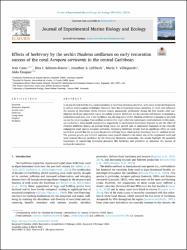| License | This manuscript is made available under the Elsevier user license. | es |
| Author | Cano, Iván | |
| Author | Sellares-Blasco, Rita I. | |
| Author | Lefcheck, Jonathan S. | |
| Author | Villalpando, María F. | |
| Author | Cróquer, Aldo | |
| Accessioned date | 2022-05-25T02:01:04Z | |
| Available date | 2022-05-25T02:01:04Z | |
| Year | 2020 | |
| Citation | Cano, I., Sellares-Blasco, R. I., Lefcheck, J. S., Villalpando, M. F., & Cróquer, A. (2021). Effects of herbivory by the urchin Diadema antillarum on early restoration success of the coral Acropora cervicornis in the central Caribbean. Journal of Experimental Marine Biology and Ecology, 539, 151541. Recuperado de: | es |
| URI | https://bvearmb.do/handle/123456789/988 | |
| Abstract | Herbivory is a key process well-known to maintain a coral-dominated state, and in the Caribbean Sea, the long-spine urchin Diadema antillarum is thought to aid coral success by removing algae from seafloor substrate that might otherwise outcompete coral outplants. In this study, we conducted a three-month manipulative experiment in southeastern Dominican Republic to test the effect of Diadema antillarum density on percent living tissue and growth rate of outplanted fragments of the critically endangered coral species Acropora cervicornis. | es |
| Language | English | es |
| Published | Journal of Experimental Marine Biology and Ecology, 539, 151541 | es |
| Rights | © 2021 Elsevier B.V. All rights reserved. | es |
| Rights URI | https://www.elsevier.com/open-access/userlicense/1.0/ | es |
| Subject | Investigación ambiental | es |
| Subject | Hábitats y especies | es |
| Subject | Recursos marinos | es |
| Subject | Arrecifes de coral | es |
| Subject | Especies amenazadas | es |
| Title | Effects of herbivory by the urchin Diadema antillarum on early restoration success of the coral Acropora cervicornis in the central Caribbean | es |
| dc.identifier.doi | 10.1016/j.jembe.2021.151541 | |
| Material type | Article | es |
| Type of content | Scientific research | es |
| Access | Open | es |
| Audience | Technicians, professionals and scientists | es |


